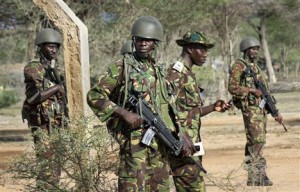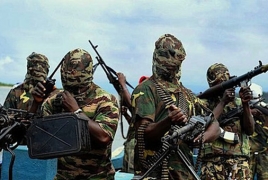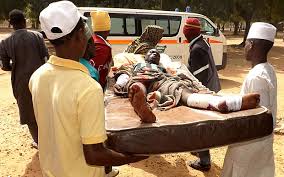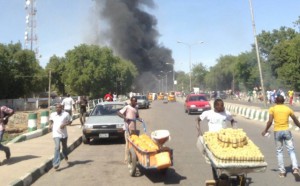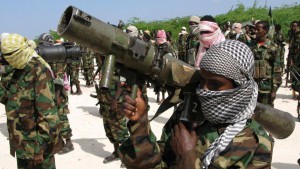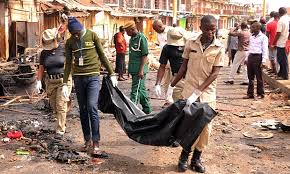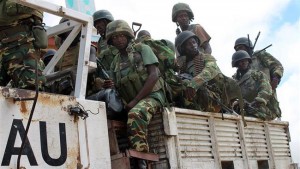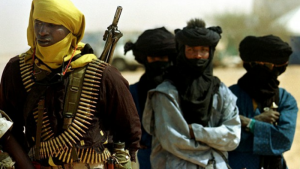Kenya to begin border operation to flush out Al Shabaab
At least 80 killed in Boko Haram strikes in Nigeria
Boko Haram Islamic extremists struck the northeastern Nigerian city of Maiduguri for the first time in months Monday, December 28, with rocket-propelled grenades and multiple suicide bombers, witnesses said. At least 50 people were killed and the death toll could go higher, the Associated Press reports.
Another twin suicide bombing killed at least 30 people in Madagali, a town 150 kilometers (95 miles) southeast of Maiduguri, witnesses said. Danladi Buba said two women blew themselves up at a market near a busy bus station at about 9 a.m. Brig. Gen. Victor Ezugwu, the officer commanding in northeast Adamawa State, confirmed the attack but said casualties have yet to be established.
In Maiduguri, capital of neighboring Borno state, at least 30 were killed and more than 90 wounded in overnight blasts and shootouts, and another 20 died in a bombing outside a mosque at dawn Monday, said Muhammed Kanar, area coordinator of the National Emergency Management Agency.
The military said there were multiple attacks at four southwestern entry points to the city.
In another blast, two girls blew themselves up in the Buraburin neighborhood, killing several people, according to civil servant Yunusa Abdullahi.
“We are under siege,” Abdullahi said. “We don’t know how many of these bombs or these female suicide bombers were sneaked into Maiduguri last night.” He said some residents have found undetonated bombs.
panarmenian.net
Minors used in explosive attack in Cameroon
Two girls that carried explosives died in the Cameroonian northern locality of Bodo, after the lethal charge exploded, causing three other fatal victims, according to reports by local media outlets.
When the minors stopped at a check point and the search began, both exploded and wounded several people that were close, said the capital’s newspaper La Nouvelle Expression.
The explosions were attributed to commando groups of the terrorist organization Boko Haram, which is losing some of its most important operational bases in Nigeria and spread throughout the bordering countries of its native soil to perpetuate fear in the minds of the populations.
As part of that strategy, the extremist group uses youths and women frequently as suicide soldiers. All of them carry explosives tied to their bodies and blocked with chains and pad locks to prevent them aborting the actions.
In the case of boys and girls, most of them previously kidnapped from the displaced population, they are forced deceitfully to carry explosive charges.
Somali Islamist group al Shabaab claim killing four security troops in northeast Kenya ambush
The Somali Islamist group al Shabaab said it ambushed a Kenyan security vehicle in remote northeastern Kenya on Sunday, killing four members of the security forces.
The Kenyan Red Cross said in a post on Twitter that two police officers had been killed and two others injured, while a Kenyan police spokesman said he was unaware of the attack.
“Security has been beefed up in the region. Tension remains high,” the Red Cross said.
Sheikh Abdiasis Abu Musab, al Shabaab’s military spokesman, told Reuters the militants had ambushed the car on the main road in Mandera County, on the Somali border, killing four Kenyan soldiers, and seizing their weapons.
The statement made no mention of police.
Al Shabaab and officials often given conflicting details and death tolls.
Al Shabaab, which seeks to overthrow Somalia’s Western-backed government and impose a strict version of Sharia law, has carried out regular assaults in neighboring Kenya in retaliation for Kenya contributing troops to an African Union peacekeeping force in Somalia.
The attack in Mandera County came two days after al Shabaab, which has links to al-Qaida, targeted two Kenyan security vehicles in Lamu County, killing at least one police officer.
japantimes.co.jp
Nigeria: fresh explosion kills many in Maiduguri mosque
At least 20 persons were killed in a fresh explosion in Maiduguri, the Borno State capital, Monday morning, as residents gathered around a mosque.
The explosion sounded as residents speculated that a fleeing Boko Haram bomber abandoned an improvised explosive device in the area during Sunday night’s attack on the city.
A police officer, who informed PREMIUM TIMES of the incident, said the victims had gathered to investigate if a bomb was truly abandoned in the mosque.
“I have never seen such foolishness when people would go peeping into a mosque to find out if truly there was an explosive deposited in a place. But sadly, the bomb went off and over 20 persons were killed and many injured.”
But the account of Malam Suleiman, a primary school teacher in the area, was slightly different.
“The people normally sit down around the mosque in the morning,” he said. ”The place is like a meeting point where neighbours converge to relax.”
“After the morning prayers they just sat down outside the mosque as usual and then the bomb went off. It was not suicide bombing like that of last night. It may have been planted.
premiumtimesng.com
Split between ISIS and Al-Qaida in Somali Shabaab raises fears of terrorism in Kenya
ISIS group of some 100 fighters in north Kenya grows with addition of break-away faction of Somali militants, including mastermind of university attack that left 148 people dead.
A breakaway faction of Somali Islamic insurgent group al-Shabaab has joined Islamic State in northern Kenya, raising fears of a surge in attacks as the groups compete for attention, Kenyan police said Friday.
Security forces believe the split could cause a surge in attacks at shopping malls, ferry-crossing points, churches, airports and railway stations as the two factions try to outdo each other in terror attacks, Inspector General Joseph Boinnett said.
“They are competing to spread an international jihadist agenda, which could be deadly if and when it happens,” Boinnett said.
The Islamic State faction has shifted its operating base to Lafey, near Mandera, where the group attacked a bus on Monday, police said.
At least two people were killed and several others injured in the attack.
The bus was carrying more than 50 passengers when it was ambushed along the road between Kutulo and Daba villages in Mandera.
The group operating in Lafey comprises about 100 fighters. Mohamed Kuno, also known as Amadheere, the mastermind of the Garissa University attack where 148 people were killed in April this year, is said to have joined the Islamic State faction.
The group is believed to be taking advantage of an unmanned stretch of the Kenya-Somalia border to plan attacks in Kenya.
“Terrorism is still a threat to us,” Boinnett said. “We have improved our response and the various security units are cooperating. This way, we have been able to foil dozens of attacks this year.”
The remaining al-Shabaab faction is believed to be comprised of fighters who are mostly from Kenya, who are operating from the Boni Forest in Lamu. The group is loyal to the Al-Qaida terrorist network.
The pro-Al-Qaida faction is headed by Omar Ahmed Abdumanan.
The militant group al-Shabaab has staged attacks in Kenya since 2011, when the country sent troops to Somalia to help the government battle the insurgents.
The militants targeted Nairobi’s Westgate shopping mall in September 2013, killing 67 people, and a university campus in the eastern town of Garissa in April, killing at least 148.
haaretz.com
Boko Haram attack on northeast Nigerian village leaves 16 dead
At least 16 people were killed and six others abducted in Nigeria when suspected Boko Haram Islamist militants attacked a village in the northeastern Biu district on Christmas Day, residents said.
Houses were burned and shops looted by the gunmen, who attacked Kimba village as night was setting in, Ishaq Abubakar, who escaped the attacked and fled to Biu town, said by phone on Sunday. Abubakar said he counted 16 bodies after the raid and fled with many survivors to Biu for safety. Yusuf Ibrahim, a leader of the vigilante volunteers in the area, also confirmed the attack in a phone interview.
Boko Haram militants are in the sixth year of a violent campaign to impose their brand of Islamic law on Africa’s most populous country and biggest economy. President Muhammadu Buhari, who took office in May, has given the army until the end of this year to crush the insurgency.
bloomberg.com
Burundi protesters slam African Union plan for peacekeepers
Thousands of supporters of Burundi’s President Pierre Nkurunziza have protested against a plan by the African Union to deploy peacekeepers to the country, APA reports quoting Press TV.
The protesters took to streets in several cities, including the capital, Bujumbura, on Saturday.
The AU has decided to send 5,000 peacekeeping troops under the African Prevention and Protection Mission in Burundi (MAPROBU) to quell the escalating unrest in the country.
Burundi has been rocked by turmoil since April, when it was announced that Nkurunziza would run for a third term in what was viewed by the opposition as unlawful and against the constitution.
Nkurunziza paved the way for a revision in the constitution to take part in the presidential race and was re-elected in July, but the violence has since escalated.
The demonstration in the capital was led by Vice President Gaston Sindimwo, who said the army is capable of halting violence and protecting all Burundians. Other protests were held in areas across Ngozi Province, Nkurunziza’s hometown and a stronghold of the ruling party.
Burundi’s government has rejected the AU plan. It says the troops are part of an ‘invasion force.’
“Burundi is a member of the African Union and has not accepted those forces. How can they say the AU has decided, yet Burundi has not accepted?” Sindimwo said.
Alice Nakuto, a member of the ruling party’s militia known as Imbonerakure who took part in Ngozi protests, said, “We would like to warn AU troops that the majority of Burundians don’t want them and they should not impose themselves on the people of Burundi.”
People gesture on December 26, 2015 during a demonstration against the Republican Forces of Burundi on the beach of the Lake Tanganyika near the port of Bujumbura. (AFP Photo)
Earlier this month, nearly 90 people died when three military installations were attacked by rebels who said this week they are fighting to topple Nkurunziza.
At least 400 people have died in Burundi’s violence since April. About 220,000 have fled to neighboring countries, according to the United Nations.
On December 24, Bujumbura announced that it would swiftly crush rebels after they announced a day earlier that they had joined forces to create the Republican Forces of Burundi to oust President Nkurunziza.
The African Union says it has written to Nkurunziza urging him to agree to the deployment of the peacekeeping force.
Ugandan President Yoweri Museveni is scheduled to mediate talks between the fighting sides in Kampala next week. Fourteen Burundian groups are expected to attend.
apa.az
10 Tuareg fighters killed in Mali by Islamists
Islamist fighters killed 10 Tuareg rebels in two attacks near northern Mali’s border with Algeria this week in a growing wave of violence, Tuareg officials said.
Six fighters from the National Movement for the Liberation of Azawad, northern Mali’s largest Tuareg rebel group, were killed on Thursday when Islamist militants attacked their checkpoint in the town of Talahandak, the group said.
It added that Islamist fighters were also killed in the clashes, though it did not give further details.
Four more died on Friday when a convoy of reinforcements was ambushed on its way to the border, said Sidi Ould Ibrahim Sidat, an official with the Tuareg umbrella group, the Coordination of Movements of Azawad.
This organization signed a peace deal in June with the Malian government as part of efforts to draw a line under a series of separatist uprisings.
He blamed the attacks on fighters from al Qaeda in the Islamic Maghreb (AQIM), the Movement for Unity and Jihad in West Africa (MUJWA), Ansar Dine and the Macina Liberation Front.
“The attacks were caused by Islamists … that are opposed to the peace deal,” Sidat said. “AQIM, MUJWA and Ansar Dine have even met to put in place a coalition.”
Islamist groups hijacked a Tuareg rebellion in early 2012 to seize Mali’s desert north. A French-led intervention scattered them a year later, but Islamist fighters have stepped up attacks this year.
Nineteen people, most of them foreigners, were killed in an assault on a luxury hotel in the capital Bamako in November.
Islamist groups AQIM, al Mourabitoun, and the Macina Liberation Front all claimed responsibility for the attack.
voanews.com
- « Previous Page
- 1
- …
- 159
- 160
- 161
- 162
- 163
- …
- 229
- Next Page »

